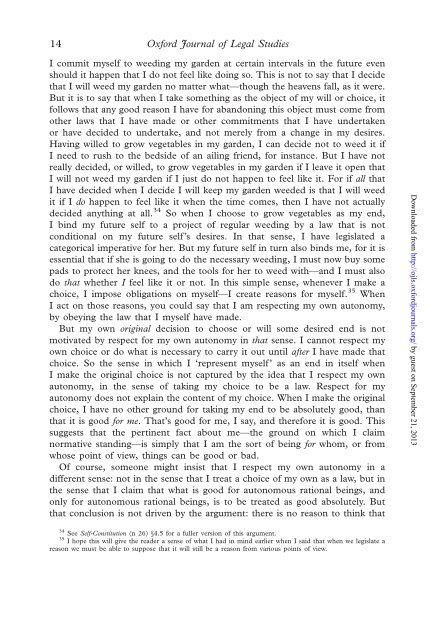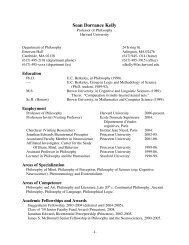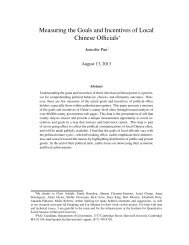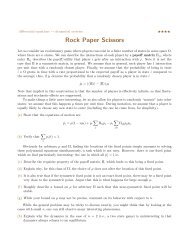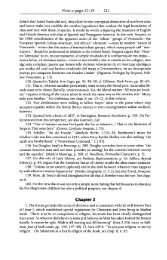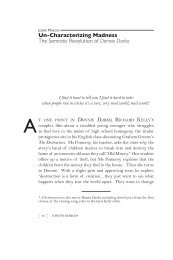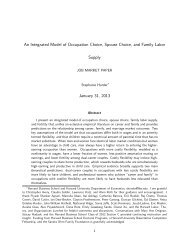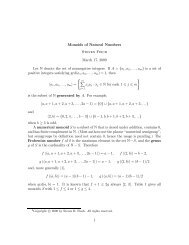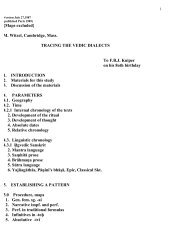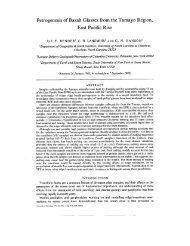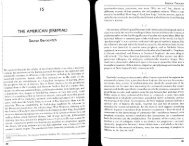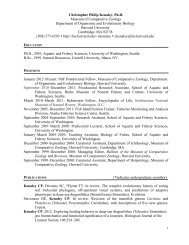Kantian Ethics, Animals, and the Law - People.fas.harvard.edu
Kantian Ethics, Animals, and the Law - People.fas.harvard.edu
Kantian Ethics, Animals, and the Law - People.fas.harvard.edu
You also want an ePaper? Increase the reach of your titles
YUMPU automatically turns print PDFs into web optimized ePapers that Google loves.
14 Oxford Journal of Legal Studies<br />
I commit myself to weeding my garden at certain intervals in <strong>the</strong> future even<br />
should it happen that I do not feel like doing so. This is not to say that I decide<br />
that I will weed my garden no matter what—though <strong>the</strong> heavens fall, as it were.<br />
But it is to say that when I take something as <strong>the</strong> object of my will or choice, it<br />
follows that any good reason I have for ab<strong>and</strong>oning this object must come from<br />
o<strong>the</strong>r laws that I have made or o<strong>the</strong>r commitments that I have undertaken<br />
or have decided to undertake, <strong>and</strong> not merely from a change in my desires.<br />
Having willed to grow vegetables in my garden, I can decide not to weed it if<br />
I need to rush to <strong>the</strong> bedside of an ailing friend, for instance. But I have not<br />
really decided, or willed, to grow vegetables in my garden if I leave it open that<br />
I will not weed my garden if I just do not happen to feel like it. For if all that<br />
I have decided when I decide I will keep my garden weeded is that I will weed<br />
it if I do happen to feel like it when <strong>the</strong> time comes, <strong>the</strong>n I have not actually<br />
decided anything at all. 34 So when I choose to grow vegetables as my end,<br />
I bind my future self to a project of regular weeding by a law that is not<br />
conditional on my future self’s desires. In that sense, I have legislated a<br />
categorical imperative for her. But my future self in turn also binds me, for it is<br />
essential that if she is going to do <strong>the</strong> necessary weeding, I must now buy some<br />
pads to protect her knees, <strong>and</strong> <strong>the</strong> tools for her to weed with—<strong>and</strong> I must also<br />
do that whe<strong>the</strong>r I feel like it or not. In this simple sense, whenever I make a<br />
choice, I impose obligations on myself—I create reasons for myself. 35 When<br />
I act on those reasons, you could say that I am respecting my own autonomy,<br />
by obeying <strong>the</strong> law that I myself have made.<br />
But my own original decision to choose or will some desired end is not<br />
motivated by respect for my own autonomy in that sense. I cannot respect my<br />
own choice or do what is necessary to carry it out until after I have made that<br />
choice. So <strong>the</strong> sense in which I ‘represent myself’ as an end in itself when<br />
I make <strong>the</strong> original choice is not captured by <strong>the</strong> idea that I respect my own<br />
autonomy, in <strong>the</strong> sense of taking my choice to be a law. Respect for my<br />
autonomy does not explain <strong>the</strong> content of my choice. When I make <strong>the</strong> original<br />
choice, I have no o<strong>the</strong>r ground for taking my end to be absolutely good, than<br />
that it is good for me. That’s good for me, I say, <strong>and</strong> <strong>the</strong>refore it is good. This<br />
suggests that <strong>the</strong> pertinent fact about me—<strong>the</strong> ground on which I claim<br />
normative st<strong>and</strong>ing—is simply that I am <strong>the</strong> sort of being for whom, or from<br />
whose point of view, things can be good or bad.<br />
Of course, someone might insist that I respect my own autonomy in a<br />
different sense: not in <strong>the</strong> sense that I treat a choice of my own as a law, but in<br />
<strong>the</strong> sense that I claim that what is good for autonomous rational beings, <strong>and</strong><br />
only for autonomous rational beings, is to be treated as good absolutely. But<br />
that conclusion is not driven by <strong>the</strong> argument: <strong>the</strong>re is no reason to think that<br />
Downloaded from http://ojls.oxfordjournals.org/ by guest on September 21, 2013<br />
34 See Self-Constitution (n 26) §4.5 for a fuller version of this argument.<br />
35 I hope this will give <strong>the</strong> reader a sense of what I had in mind earlier when I said that when we legislate a<br />
reason we must be able to suppose that it will still be a reason from various points of view.


